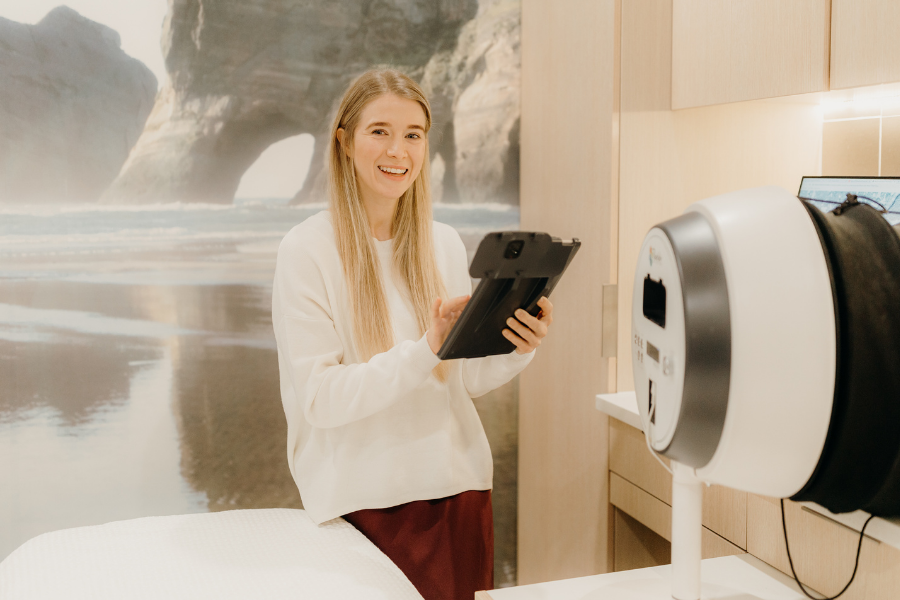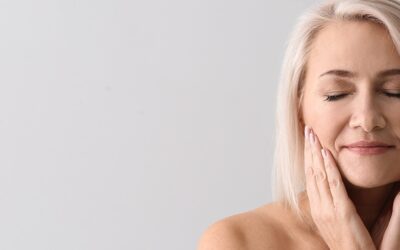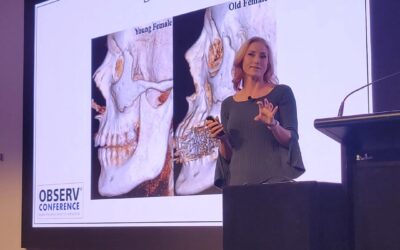We are over the moon to have Skin Therapist Bryony back from maternity leave. We sat down with her to chat about changes in the skin during pregnancy and postpartum as well as skin myths and her favourite treatments to support your skin during the upcoming colder months.

Welcome back! We are so happy to have you back in clinic. What have you missed the most while being on maternity leave?
I’ve missed my clients and our amazing team. Working at TFP, getting the great results we do and really getting to know my clients on a more personal level gives me so much fulfillment. I love seeing my clients build their confidence through their skin journey.
We know you are a huge fan of needling – tell us why and what are the benefits?
Ever since I discovered needling for myself, I would consider myself a true addict!
Small perforations are made in the skin using a roller or pen device. This activates the skin’s own reparative process, creating strong healthy collagen fibres, strengthening skin structure and stimulating elastin growth. Pores can be refined, redness can be reduced and stubborn pigmentation can improve, producing an overall more even-looking tone and texture to skin. I have also found that over time needling improves barrier function, which is essential because as we age and hormones fluctuate, our production of ceramides and lipids naturally decreases.
There are very few side effects or contraindications to the treatment, but I am a big advocate for prepping the skin well in advance. The healthier your skin is prior to the treatment, the better long-term outcome you will have.
What are some common skin changes women can experience when pregnant and postpartum?
The way your skin will react during this time is unpredictable as every pregnancy is unique. Some of the most common skin concerns that I come across are acne, increased open and closed comedones (blocked pores), hyperpigmentation and skin sensitivity. I personally experienced a big surge in sebum production (oil), which lead to more open and closed pores.
Another common change is melasma aka the ‘mask of pregnancy’. This condition causes dark, discolored patches on the skin. While many treatments can aggravate this condition, needling is a safe option that can deliver a real improvement, alongside a reduction in general photo-damage/pigmentation.
Postpartum, estrogen and progesterone plummet within days often leading to dry, sometimes sensitive skin. Insufficient estrogen levels decrease defence against oxidative stress and lead to impaired barrier function, accelerating ageing dramatically. Combine these hormonal changes with a poor diet (let’s be honest – eating well when you have a newborn is hard) and sleep deprivation, mothers often feel they have aged significantly over a short period of time.

Bryony with her baby girl, Maia.
How do hormonal changes affect your skin and what can be done to help?
Skin cells have hormone receptors so even the slightest change can impact your skin dramatically. An increase in androgen hormones is generally associated with thicker sebum (oil) production, leading to congested, acne-prone skin. In contrast, a decrease in estrogen can cause a drop in lipids (fats, oils, waxes, and vitamins), which can lead to impaired barrier function, resulting in inflammation and chronic dryness.
Working with a skin therapist is always best, but this is particularly important when dealing with hormonal changes as your skin can be unpredictable. During pregnancy and breastfeeding, it’s important to ensure any treatment or product is safe for you and your baby. Lactobotanical peels and Healite treatments are great for supporting barrier function, accelerating cell turnover and decreasing inflammation. The topical application of vitamin A and vitamin C is the backbone of your homecare, helping to repair and protect the skin. This should always be assessed by a skin professional and recommended to meet your individual skin needs as there are various forms and levels.
What is the best way to support your skin during pregnancy and postpartum?
The basis of the skin’s needs do not change significantly during pregnancy and postpartum but adjustments need to be made depending on how your skin is responding to the fluctuation in hormones. It is important to pre-empt the elevation in MSH (melanin stimulating hormone), by ensuring skin is well protected from UV at all times. This will help minimise increases in hyperpigmentation or melasma that may present itself. Unfortunately, hyperpigmentation can worsen even with the most stringent use of SPF, which is why a combination of antioxidants and melanin inhibitors should always be a big focus.
Establishing a good homecare routine is essential as your skin’s first line of defence against hormonal and life changes that come with having a baby. This is a great baseline from which to build, allowing us to add in treatments or skincare to get your skin functioning optimally.
What are some of the biggest myths in skincare today?
I often come across clients that feel they need to change their homecare products constantly in order to stimulate a response, when really the complete opposite is true. If you are constantly changing the products you use, your skin doesn’t have adequate time to build up sufficient levels of essential nutrients which stimulate cell-to-cell communication and start the reparative process.
People often believe they must be a purist when it comes to skincare brands, which is something brands would like you to believe. However, using a range of cosmeceuticals from different brands can work well in the hands of an experienced practitioner. We have several brands at TFP giving us the opportunity to meet the needs of each client individually and ‘cherry pick’ products for their specific ingredients or formulations. A big myth is that an active ingredient claimed to be in one product, will be the same in another. There are so many complexities to products, ingredients are just one factor to take into consideration. A lot of ingredients can be purified or chirally corrected which often changes the way your skin will respond. The potency, the pH and the delivery system must all be taken into account alongside the other ingredients in a formulation.
I am always skeptical of new treatments promising results overnight. This is very often too good to be true and post-treatment side effects are sometimes not seen until much later. Home gadgets can be a helpful tool in skin maintenance, but they are not a substitute for personalised in-clinic treatments. People need to be wary of gadgets that may not be right for their skin type or particular concerns. Despite hefty price tags, some home skincare gadgets are ineffective and some can actually cause damage.
What are the best treatments to support your skin heading into winter?
Supporting your skin with a complete home routine is important to help prevent the effects of seasonal changes like flare-ups of dermatitis, chronic dryness and sensitivities. A great treatment option to enhance the body’s own cellular recovery is the Healite ll, a phototherapy, emitting a specific wavelength that activates the mitochondria (like an energy factory). This accelerates healing, encourages skin rejuvenation, improves lymphatic system activity and stimulates cells that are directly responsible for producing hyaluronic acid. Treatment every two to three days over a minimum of eight treatments is needed to optimise your results for skin recovery or gentle skin rejuvenation. The added bonus is the relaxing shoulder massage that comes with this treatment – great for the skin and a little time to de-stress!
Winter is always the best opportunity to have treatments that are not always appropriate during summer. A course of needling or IPL treatment is best done in the cooler months, due to photosensitivity risks and generally less social events. Vitamin A peels are a staple treatment to stimulate the repair process, which can be further enhanced when combined with salicylic acid or Jesner-style peels.

Bryony will be working Mondays, Tuesdays, and alternate Saturdays at our Britomart clinic.
Always consult your skin therapist as to what treatments and products will be most appropriate for your skin.
To start your skin journey with us, book an Initial Skin Consultation.




